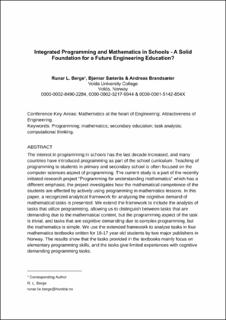Integrated Programming and Mathematics in Schools - A Solid Foundation for a Future Engineering Education?
Chapter
Accepted version
Permanent lenke
https://hdl.handle.net/11250/3042313Utgivelsesdato
2022Metadata
Vis full innførselSamlinger
Originalversjon
Järvinen, H.-M., Silvestre, S., Llorens, A. & Nagy, B. (eds.) (2022).Towards a new future in engineering education, new scenarios that European alliances of tech universities open up. Proceedings, 50th Annual Conference of The European Society for Engineering Education 10.5821/conference-9788412322262.1394Sammendrag
The interest in programming in schools has the last decade increased, and many countries have introduced programming as part of the school curriculum. Teaching of programming to students in primary and secondary school is often focused on the computer sciences aspect of programming. The current study is a part of the recently initiated research project “Programming for understanding mathematics” which has a different emphasis; the project investigates how the mathematical competence of the students are affected by actively using programming in mathematics lessons. In this paper, a recognized analytical framework for analysing the cognitive demand of mathematical tasks is presented. We extend the framework to include the analysis of tasks that utilize programming, allowing us to distinguish between tasks that are demanding due to the mathematical content, but the programming aspect of the task is trivial, and tasks that are cognitive demanding due to complex programming, but the mathematics is simple. We use the extended framework to analyse tasks in four mathematics textbooks written for 16-17 year old students by two major publishers in Norway. The results show that the tasks provided in the textbooks mainly focus on elementary programming skills, and the tasks give limited experiences with cognitive demanding programming tasks.
